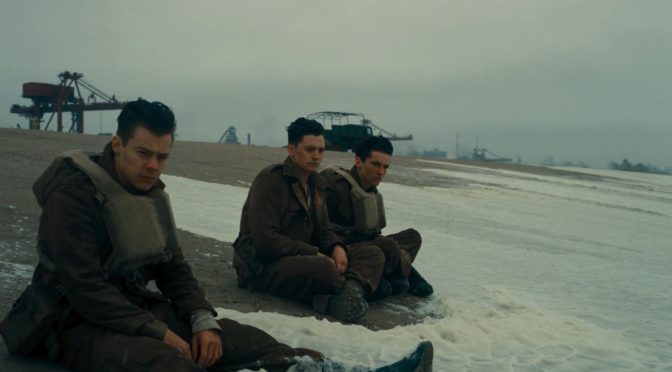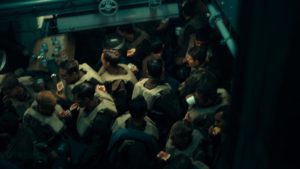Christopher Nolan’s Dunkirk received instantaneous, almost unanimous raves from the moment it screened in early July of 2017. It went on to earn eight Academy Award nominations, eight BAFTA nominations, and an endless list of wins and nominations from both critics and industry guilds. It comes from the creator of critical and popular hits like Memento, The Dark Knight, and Inception, yet it had a host of critics lining up to anoint it as the new apex of his filmography. It vaulted to an astronomically high score of 94 on Metacritic and made more than $500 million in worldwide box office. If you judge a film’s success as being some combination of reviews and the number of sheer eyeballs that watch the thing, then Dunkirk is your unimpeachable 2017 champion. And for all that, I have to posit that it may be the most underrated film of the year. Somehow, most of the conversations I have had about it have carried a sense of being underwhelmed, which is an odd reaction to have to a dynamically directed, feverishly intense, critically adored Oscar player that half of the world paid IMAX money to see. The thing I have found about Dunkirk is that it is so very much its own beast that it vexes a wide spectrum of viewer expectations. The film provokes strong opinions about what it actually is, what it should be, and what it needs more of, and the strangest thing of all is that there is no decisive consensus as to what the film needs more or less of. My family was impressed by the spectacle of it but found it to be a chilly, clinical experience without a lot of human interest. They echoed the feelings that a number of friends have had regarding a paucity of memorable, distinct people to take us through the story. I understand this criticism, yet I find myself on the opposite end of the spectrum. I could have done with even less characters; even less of a conventional human angle. I am a lover of great characters and writing. My top ten of 2017 is overwhelmingly populated by character studies. But in this one case, I wanted even less of it. I found myself wishing Nolan had given me an even drier martini (and that will be the last time the word “dry” comes up when discussing this sopping wet movie), with even less of the olive juice of human interest. There is a moment early in the film when a weary, tense line of British soldiers stands on a dock waiting to board a boat. The rough surf roars up at them. As the waves crash at them, they all duck in unison and just as soon stand back up as a unit. This line of men looks like some kind of human wave, like an extension of the ocean itself. This was my moment of nirvana with Dunkirk and it was the special quality I wanted more of in the film. It was a moment of dynamic, wordless, utterly shot-based cinema, like I might get from a Kubrick or Tarkovsky film. And while I understand wanting more human voices in what is largely a tale of noble human fortitude, I was nonetheless brought back down to earth a bit whenever the film paused to let a character give some speech. And I am not saying that my take is the definitively correct one. What I am saying is that Christopher Nolan has made a film that seems to confound expectations about what makes a great war film. And in a year that was relatively short on the ground for boldly uncompromising works, Dunkirk’s ability to both conquer the box office and still be kind of polarizing is its own intrinsic medal of honor.
What is really exceptional about all this is that Dunkirk never really had to be this idiosyncratic. To be frank, when I heard that Christopher Nolan was making a film about the famous Dunkirk rescue in World War II, I did not anticipate any idiosyncrasy whatsoever. I have loved a number of Nolan’s films in the past and I anticipated a well-made war picture, but I was also sure that this would be his attempt to make something broadly appealing and inspiring. And the thing is Dunkirk is something of an inspiring movie. It just also happens to the year’s most brutally visceral cinema experience. Dunkirk is a terse, relentlessly intense telling of Operation Dynamo, the British mission to rescue over 330,000 Allied troops from the beaches of Dunkirk, France where they faced almost certain capture by the Nazi armies. In history books, Dunkirk often comes up under the heading, “The Miracle at Dunkirk”, emphasizing heroism in the face of adversity and long odds. The Miracle of Dunkirk would see Britain rally to save hundreds of thousands of soldiers, with many British civilians coming to assist with the rescue in private boats. Operation Dynamo unexpectedly thwarted a crushing Nazi victory and very likely saved Great Britain from being coerced into a conditional surrender with Germany. As some Dunkirk detractors have pointed out, there was a lot of nuanced historical context to this situation, including the involvement of non-British forces in the conflict and the complex strategic considerations that led Germany to spend three days pummeling the surrounded troops but not making a decisive strike to defeat them. And of course there was the matter of Winston Churchill, only some 220 miles away in London, advocating for Parliament to send relief to those beaches, which was the substance of 2017’s Darkest Hour and is nowhere to be found in this film. To sum it up, Dunkirk features none of the following: major strategic discussions, speeches to any government body, visible Nazi soldiers, Winston Churchill, and, for the vast majority of its runtime, any place on God’s green earth outside of the shell-pocked beaches and choppy waters of Dunkirk. What Dunkirk does feature is terrified men, a positively demonic symphony of bullet whizzes and engine whines, endless alternating torrents of water and fire, relentless action, and a hypnotically teeth-gritting Hans Zimmer score that would be well over the top in any film where vicarious shellshock was not the raison d’etre. Dunkirk gets one of its few moments of relative calm out of the way in its first minute and it spends that minute acquainting us with our harrowing situation and letting us know that there will be precious little peace in the 100 minutes to come. A small group of soldiers walk through the deserted streets of Dunkirk as a deceptively gentle rain of white leaflets falls down upon their heads. The leaflets show a map of Dunkirk and stark block letters read, “YOU ARE SURROUNDED”. One soldier (Fionn Whitehead, very good as the closest thing the film has to a main protagonist) grabs a handful to use later as toilet paper. No sooner have the men stopped to check their surroundings then an ear-splitting hail of machine gun fire pierces the eerie stillness. The men, who we have not known for much more than thirty seconds, are all gunned down as they flee, with the exception of Whitehead’s character. The lone soldier makes it behind the tentative safety of a cluster of sandbags guarded by French soldiers. Even that safety feels unbearably shaky, however, as the monstrous din of the gunfire seems to follow him even as he runs further behind the French line. The cacophony chases him and us until we reach the dismal dead-end of that beach full of soldiers. The plot of Dunkirk focuses on the desperate struggle to escape from this place while under the constant, faceless threat of German bombs, bullets, and torpedoes. Dunkirk is a historical war piece that exists almost entirely as an enervating action survival film. What makes it unique, apart from Nolan’s decision to strip most of the prestige away in favor of unflagging terror, is its time structure. Nolan and his editor Lee Smith (unquestionably and almost necessarily the most valuable contributor to the film’s success) cut with brisk, hurtling energy between three places and time periods. The first is a week before the evacuation, as Whitehead’s character and a multitude of other soldiers (including British singer and heartthrob Harry Styles) wait at the docks, trying to put men on boats and vainly struggling to dodge the strafing of German planes. The second time period takes place at sea a day before the evacuation, as a British private craft manned by a kindly civilian (reliably well-played by British national treasure Mark Rylance), his son and his young employee sails to Dunkirk. The last period takes place in the air one hour before the evacuation as British pilots (one played by Tom Hardy) fly to provide the evacuation with air cover. Dunkirk is the story of three different groups of men constrained to a limited view of war and all the more terrified for not knowing the bigger picture. Dunkirk is not the first war film about just trying not to die and it is not the first to argue that war is a hard thing to fathom when you’re in the middle of it. But it may be the only film I can name to make the claustrophobic scramble of surviving war feel this chaotic, merciless, and physically draining. Dunkirk is Christopher Nolan’s most purely sensory work. It is a wildly successful attempt to capture how time must feel within the metallic maelstrom of battle.
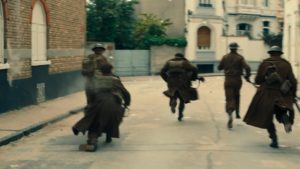

An easy way to illustrate the overall effect of Dunkirk would be to say that it extends the first fifteen minutes of Saving Private Ryan across an entire film. That’s frankly a little reductive and it ignores the fact that Dunkirk communicates some pretty rich ideas, but one cannot fully compliment the multi-faceted achievement of this film without pointing out that it is some of the most perfect action cinema ever captured. It is an absolutely beautiful, majestically assaultive action film. If Dunkirk were nothing but the most propulsive, maniacally tense, ingeniously crafted action film of the year, I would still feel a strong obligation to write about it and recommend it. One cannot take pure, visceral, heart-pounding cinema like this for granted. As an act of sheer, harrowing spectacle alone, it is one of the year’s most beautiful and intelligent works of art. And I say intelligent because it is not just that Dunkirk looks impressive or that it moves with astonishing power or that the sheer scope of the thing is jaw-dropping. There is also a keen sense of how great action cinema does more than pry open your eyes and assault your ears. Nolan has always had a shrewd understanding of how our fear sensors operate. He relishes not just the explosive moments, but the foreboding lulls right before something catastrophic happens. Before he sinks a carrier ship and sends it to the bottom of the sea, he watches two soldiers push nervously through the crowd to be closer to the door and holds on them anxiously looking at it. We shiver at the possibility that this ship could flood with water long before we see it happen. Before a vast swath of oily ocean goes up in flames, we have a moment to process that a group of shipwrecked soldiers are floating in it. Then a faraway voice screams, “Oil! You’re in oil!” This is action cinema so brutal and unrelenting that it becomes poetic in its fury . Dunkirk values an almost musical sense of pacing. To use an old cliché, this is the quintessential case of a director holding his audience in the palm of his hand. We tremble at coming down from the latest dreadful adrenaline rush because we know the film is only easing our anxiety so we will be vulnerable for the next moment of panic. Putting an experience like Dunkirk into words is futile, but the fact is that no movie made me feel a more elated sense of terror. And that elation does not mean that you don’t feel genuine empathy and compassion for the men going through this ordeal. But Dunkirk is so skillful at hooking an IV drip of adrenaline to your veins that it is impossible not to feel perversely enlivened in a mortified way. Nolan understands that the great heart-pounders need to do more than just throw sound and fury at the audience. You must also be continually setting up new payoffs. You must not neglect the fine art of making your audience wait. In Dunkirk, Nolan demonstrates an impeccable knack for laying down timebombs in one scene that will go off two scenes later.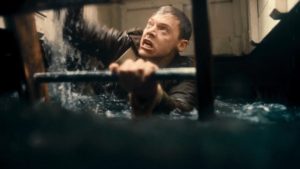

And if the marvelous craft and precise timing of Dunkirk were not impressive enough, let me also join the chorus praising Nolan for making fruitful new use out of some of his oldest tricks. Dunkirk is not the first Nolan film to play with the concept of time as a kind of prison (Memento) or to place a story within a multi-tiered temporal structure (Inception). But I do not know that he has ever used the tricky, prismatic nature of time to more rigorously suspenseful effect. It is the reason that even those scenes where the gunfire dies down have an unbearable, suffocating dread to them. On a purely surface level, this device imbues the film with an urgency that is immediate and unbelievably bracing. From the moment Hans Zimmer’s timebomb of a score started its first metronomic ticks and two of our soldiers went racing down the beach with a stretcher, a knot formed in my stomach and a strange, nervous half-grin spread across my face. It was terrifying and unbearable and also undeniably exciting. I don’t know that I felt a more primal rush all year than when the gears of Nolan’s unforgiving doomsday clock started to turn and the film made its first rotation through the three tiers of time. Even as a purely superficial thrill ride, Dunkirk has a grimly entertaining sense of purpose. Fortunately, Dunkirk is not simply a dazzling piece of narrative machinery. What Nolan set out to do, by his own admission, is to use the cruel, rigid bars of these time structures to tap into the idea of war as a fickle, arbitrary, and incomprehensible game of survival. The soldiers on that beach do not know that civilian boats are days away from rescuing them or that some small amount of air support will rally to their aid in the nick of time or that a strategic gambit by Hitler and his generals will keep the Nazis from massacring them right where they stand. They only know this terrible moment and this wretched, doomed expanse of sand. Dunkirk takes the World War II story with one of the most famous happy endings and spends most of the film showing how, until that happy deliverance arrived, this place was a violent, forsaken hellscape. Dunkirk shows how time and our limited perspectives play potently off one another and how especially excruciating that must be in the context of war. It is a straightforward but powerful idea, and the devastating marvel of it all is how Nolan uses skillful physical acting, astonishing practical effects, and a tremendously effective plot structure to make you feel a trapped soldier’s dilemma in your bones. It is a simple enough thing to say that one intends to use temporal cross-cutting to convey the heightened fear and uncertainty of battle and quite another thing to pull it off with this level of precision, immersion, and even sneaky emotion. Any number of directors could have conceived of the kind of roaring engine needed to power a movie like this, but only someone with an exceptional grasp of pure, muscular filmmaking could have built it. Only a director with both an impeccable grasp of whiz-bang storytelling and an auteur’s sense of why that story needed to be told in that way could have built something this visually and sonically mesmerizing and quietly rich in ideas. Just as he did with The Dark Knight, Nolan has created a rousing, indecently thrilling popular entertainment that is also brutal, bruising, and exhausting.
And this astonishing onslaught almost never lets up for the entire 100 minutes. We are placed among a mass of men running around the trap of this surrounded beach with no inkling that help is coming and little time to do anything but run, hide, and pray that their next frantic stab at survival doesn’t lead them to a watery grave. And every now and then we return to Mark Rylance on his boat or Tom Hardy in his cockpit, mostly to remember that help is actually coming for these poor souls, and also to remember that those coming to the rescue are in no small amount of danger themselves. For all its relentless menace, Dunkirk does care about these people and about the unlikely triumph of this moment in history, and so we get some small ration of character and dialogue to keep us sated and sane. But, while I cannot begrudge anyone for wanting more humanity in this flurry of death, who these people are is so completely not the point of this film. To hear where the soldiers come from or which of them wants to go to university or to learn that Whitehead’s character wants to open a fish-and-chips shop in Brighton when he gets home would be utterly immaterial. It would be downright counter-intuitive to the film’s desperate, headlong momentum and to the greater points Nolan is making about war and survival. Dunkirk is an elemental film. It is rushing water and blazing fire and air whipping around the wings of fighter planes. It is tons of blackened earth flying high into the sky and crashing down around us. And it is human beings who have no choice but to become elements themselves. There is no choice but to hug the earth and plunge into the cold waters and become one with whatever part of this landscape isn’t exploding. And when our characters are not silently running, crouching and swimming from death, they are quietly moving toward other men in the hopes of finding some safety in small clusters. The men in Dunkirk behave like molecules. We do not find out if any of them have best girls at home because it does not matter, least of all to them in this moment. Nolan’s vision of war is beyond humanity, which maybe makes it sound like there is some truth to the critique that Dunkirk is too cerebral and efficiently cold for its own good. But I would maintain that the sheer intensity of the thing is actually what makes it more human. It is a vision of how much war strips away from people. Nolan is a good enough director of actors that I never once thought of these men as bland cogs. One can read the bleak dehumanization of this ordeal on their grubby, blanched faces. The fear when the water rushes over their heads. In one of my favorite shots, a soldier narrowly avoids drowning and pops above the water just in time to hear an explosion go off above his head. He plunges immediately back under and throws his hands above his head with the teary frustration of a child. Where does one have to go to not die in war? What does one have to become? Can I just be a fish? Do men have to become waves? I look at this man’s frail, flailing terror and I find the humanity that some say the film lacks. But, if any viewer looks at these quiet, huddled men and cannot entirely make out a fully fleshed human being, that may say a lot on its own.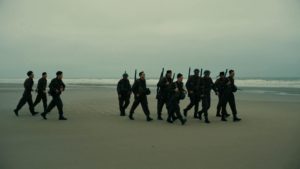

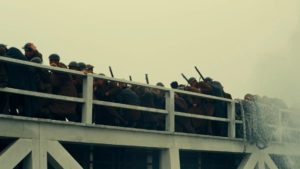
What makes Dunkirk the year’s most underrated film may be how it seems to exist in between so many polarities. I have heard some wave it away as being too traditional, just one more World War II drama in a cinema landscape full of them. I have heard others complain that this nerve-rattling action extravaganza was too atypical of what they seek in movies about this time and conflict. It did not give them enough of the heart-tugging prestige they expected from what is arguably the Great War’s most touching moment of human fortitude. Dunkirk is the year’s most idiosyncratic traditional film, and the year’s most inspirational art film. For much of the film men become part of an almost faceless tapestry, yet we also find time for weighty speeches about country, duty, and sacrifice. Zimmer’s score screeches and sneers and then gives way to lovely, swelling strings. Dunkirk is a phenomenally exciting blockbuster smash and also might be the most cerebral, austere war film since The Hurt Locker. It is a luscious, grand entertainment full of derring-do and it also watches in frozen horror as a ships full of screaming men sink to the ocean floor like metal tombs. It is pathos and blood-curdling terror, together and in proportions that we do not often see. There are few things more safely respectable than a World War II picture, yet somehow the one thing Dunkirk never becomes is safe. Even its final reading of Churchill’s famous speech feels like something strange and a little unhinged. It feels like both a sincere appreciation of valor and bravery and a haunted, knowing acknowledgment that all this rhetoric is probably stuff and nonsense. Dunkirk is a miraculous hybrid of lofty war drama, peerless action spectacle, and harrowing thriller. It oscillates between the three, perhaps because a tale like Dunkirk is just too messy to told in a single way. The lesson may be that seemingly straightforward stories like this are never as tidy as they are made out to be. Nolan is clearly proud to honor the people who were part of this rescue mission. He knows the value this miracle story holds for Great Britain and for people around the world. But he also knows that narratives come after the fact. It is natural for the living to tell stories of survival, but survival itself has little need of words.
